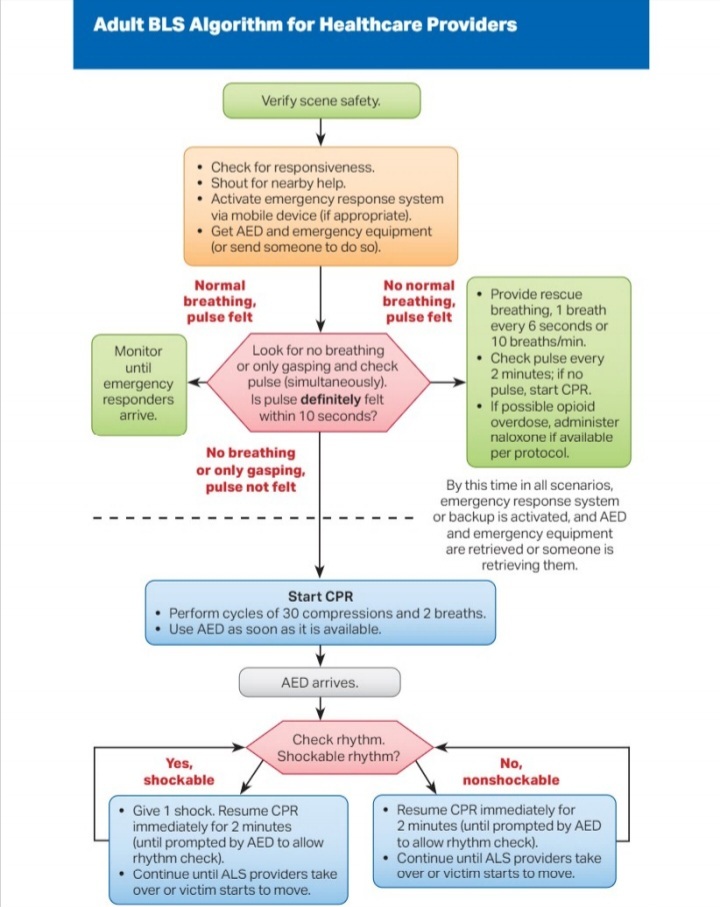(Images can be enlarged if needed)

Cardiac arrest, also known as Sudden Cardiac Arrest, is when the heart stops beating suddenly. The lack of blood flow to the brain and other organs can cause a person to lose consciousness, become disabled or die if not treated immediately.
The terms ‘heart attack’ and ‘cardiac arrest’ are often used interchangeably, but these are two different heart conditions.
A heart attack occurs when there is a blockage in the arteries that stops blood flow in the heart. Due to the lack of blood and oxygen flowing in the heart, the heart muscle tissue will become damaged. Heart attacks can increase the risk for cardiac arrest because heart attacks can alter electrical signals in the heart.
CPR – or Cardiopulmonary Resuscitation – is an emergency lifesaving procedure performed when the heart stops beating. Immediate CPR can double or triple chances of survival after cardiac arrest.
If someone experiences cardiac arrest, they need immediate treatment to increase the flow of oxygen-rich blood to their organs. CPR is the compression over the chest to manually pump a patients heart. Rescue breaths are preformed to provide oxygen to the body.
During CPR, proper hand placement on the lower half of the sternum is crucial. Placing hands over the sternum ensures effective chest compressions directly above the heart, optimizing blood circulation throughout the body.
According to the American Heart Association (AHA), the overall survival rate for out-of-hospital cardiac arrest is around 10%. However, survival rates can be improved if bystander CPR is started immediately. Studies have shown that bystander CPR increases the chances of survival for someone experiencing cardiac arrest. In fact, the AHA reports that survival rates increases to 40% or higher when bystander CPR is performed promptly. The surival rate is between 24% and 40% for those that happen in the hospital, according to the report published online in the Emergency Medicine Journal.
CPR is preformed between 100 - 120 beats per minute. Famously Staying Alive by the Bee Gees is the same beat. A large list of songs with the correct BPM can be found here
![]() The American Red Cross gives the following list of steps to asses if CPR is needed and how to preform:
The American Red Cross gives the following list of steps to asses if CPR is needed and how to preform:
1 CHECK the scene for safety, form an initial impression and use personal protective equipment (PPE)
2 If the person appears unresponsive, CHECK for responsiveness, breathing, life-threatening bleeding or other life-threatening conditions using shout-tap-shout
3 If the person does not respond and is not breathing or only gasping, CALL 9-1-1 and get equipment, or tell someone to do so
4 Kneel beside the person. Place the person on their back on a firm, flat surface
5 The American Red Cross CPR guidelines recommend 100 to 120 chest compressions per minute, 30 at a time. Remember these five points:
Hand position: Two hands centered on the chest
Body position: Shoulders directly over hands; elbows locked
Compression depth: At least 2 inches
Rate of compressions: 100 to 120 per minute
Allow chest to return to normal position after each compression
6
Give 2 breaths
Open the airway to a past-neutral position using the head-tilt/chin-lift technique Pinch the nose shut, take a normal breath, and make complete seal over the person’s mouth with your mouth. Ensure each breath lasts about 1 second and makes the chest rise; allow air to exit before giving the next breath Note: If the 1st breath does not cause the chest to rise, retilt the head and ensure a proper seal before giving the 2nd breath If the 2nd breath does not make the chest rise, an object may be blocking the airway
7 Continue giving sets of 30 chest compressions and 2 breaths. Use an AED as soon as one is available! Minimize interruptions to chest compressions to less than 10 seconds.
Sources:
https://www.hopkinsmedicine.org/health/conditions-and-diseases/cardiac-arrest
https://cpr.heart.org/en/resources/cpr-facts-and-stats
https://www.mycprcertificationonline.com/blog/cpr-success-rate
Instructional images from the AHS Basic Life Support Manual (2020)
Join our public Matrix server! https://matrix.to/#/#tracha:chapo.chat
As a reminder, be sure to properly give content warnings and put sensitive subjects behind proper spoiler tags. It's for the mental health of not just your comrades, but yourself as well.
Here is a screenshot of where to find the spoiler button.



One of the "signs you're trans" symptoms I see often is "imagining yourself as the opposite gender". For a long time I didn't think this one applied to me, but thinking back, it kind of did. I didn't think it applies because I never imagined a feminized version of myself, but sometimes, in some situations, I imagined myself as a fictional female character, or some completely imaginary person that doesn't look anything like me (in terms of facial/body features, ethnicity, etc). Did anyone else experience "imagining yourself as the opposite gender" like this?
Yeah, I did in high school. Then that thought got shoved way down somewhere for a couple decades.
If trans stuff was visible 20 years ago, I may have been on the so-called "incel to trans pipeline"
"Life is so much easier for girls! Life would be so much better if I were a girl "
"
sexy dreams cw: discussions of horny
so i did get a few dreams of having sex as a woman during my teenage years, but the one that mostly has stayed with me was a threesome with another woman and a guy with me sandwiched in between.
It's fascinating to look back on that, like I am these days, but getting fucked by a cis-man isnt really high up on the sexual priorities list. Would love to chain them up and slowly break them apart though
these days, but getting fucked by a cis-man isnt really high up on the sexual priorities list. Would love to chain them up and slowly break them apart though 
mostly i imagined myself formless uploaded into a computer somewhere, maybe having a femme looking hologram body. those dreams did make me think too much, so I pushed all of that into a tiny little box inside my mind.
For sure. Imaging something that doesn't already exist is hard. I don't have the mental image creativity for that. So... if I ever thought about myself as a girl, it would have to have been either without a mental image or using something else that I've already seen. That said, by high school I mostly just repressed thoughts like that. I don't remember enough to remember before that. After that, the only time I really did that was in sexual fantasy (which I considered allowed to be a self-judgement-free time). Like... I'm sure there were still exceptions. Like I remember one time not long before egg-cracking when I use using an umbrella as a parasol and sorta imagined myself as Edna from Tales of Zesteria because she uses umbrellas/parasols as weapons.
Also, I did go through a period of a couple years where I had a typically to use crossover crossdressing anime characters for my profile picture, which seems like its probably somewhat adjacent...
I don't think I ever actively imagined myself as the opposite gender, but I definitely preferred daydreaming where the subject of the thought was a woman. I never thought of her as myself, but I very rarely ever daydreamed as myself.
Guess dream brain took my comment here as a challenge and decided to make me look like a girl in my dream. Still not something I've consciously done - I'm not usually able to do that sort of visualization even intentionally, so I kinda suspect it still just borrowed from somewhere else.